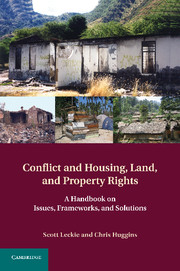Book contents
- Frontmatter
- Contents
- Opening Note and Acknowledgments
- Foreword by Dan Lewis
- 1 Introduction to the Issues – HLP Rights and Sustainable Peace
- 2 The International HLP Rights Normative Framework
- 3 Displacement, Conflict, and HLP Rights
- 4 HLP Restitution Rights
- 5 Restitution Mechanisms and Institutional Frameworks
- 6 United Nations and Other Peace Operations and HLP Rights
- 7 Protracted Displacement and Political Obstacles to the Protection of HLP Rights
- 8 Emerging Conceptual Issues
- 9 Improving International Responses to HLP Rights and Conflict
- Index
- References
5 - Restitution Mechanisms and Institutional Frameworks
Published online by Cambridge University Press: 03 May 2011
- Frontmatter
- Contents
- Opening Note and Acknowledgments
- Foreword by Dan Lewis
- 1 Introduction to the Issues – HLP Rights and Sustainable Peace
- 2 The International HLP Rights Normative Framework
- 3 Displacement, Conflict, and HLP Rights
- 4 HLP Restitution Rights
- 5 Restitution Mechanisms and Institutional Frameworks
- 6 United Nations and Other Peace Operations and HLP Rights
- 7 Protracted Displacement and Political Obstacles to the Protection of HLP Rights
- 8 Emerging Conceptual Issues
- 9 Improving International Responses to HLP Rights and Conflict
- Index
- References
Summary
Many countries have engaged in processes designed to restore land, housing, and property to displaced persons, refugees, and others who were arbitrarily deprived of their homes, lands, and properties because of conflict. Other countries have dealt effectively with sometimes large-scale restitution claims procedures and have concluded – often very successfully – a comprehensive restitution process. Still others are presently considering proposals designed to allow restitution processes to proceed. Restitution processes are often complex, time-consuming exercises that address inherently controversial and politically charged issues. Care must be taken to manage the expectations of potential claimants and ensure that the restitution process is transparent and clear. The temporal and spatial boundaries of the restitution process, for example, must be clarified, justified, and explained to the population. There is no single blueprint for success, and each country must identify its own way forward while learning from international precedents and respecting national and international laws. However, if the State (generally in conjunction with international organizations) can provide the necessary combination of impartiality, political commitment, and financial support, the pay-offs can be very significant. The legitimacy of the State in the eyes of its citizens, as well as the international community, can be much enhanced, while the resolution of potentially explosive grievances over HLP rights contributes to a more stable and peaceful political and economic legacy.
- Type
- Chapter
- Information
- Conflict and Housing, Land and Property RightsA Handbook on Issues, Frameworks and Solutions, pp. 155 - 180Publisher: Cambridge University PressPrint publication year: 2011



